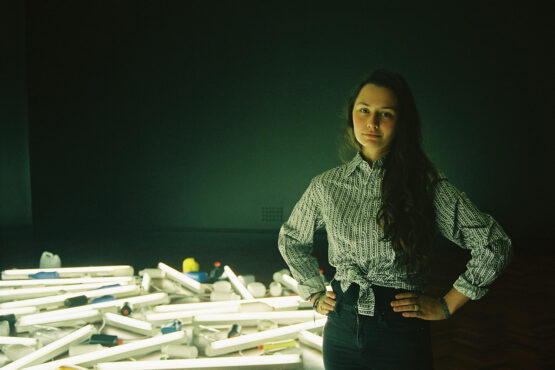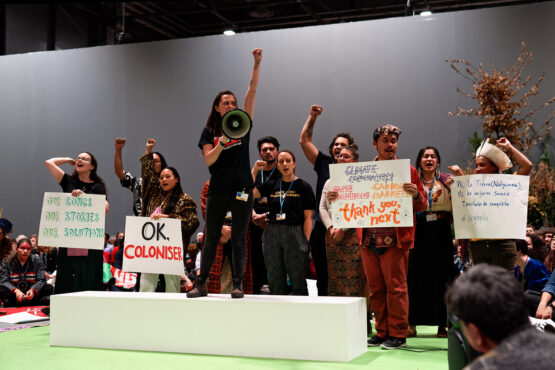Indigenous climate activist wins 2021 Stanford Bright Award
India Logan-Riley is the winner of the 2021 Bright Award, recognizing their work as co-founder of Te Ara Whatu, a group of Māori and Pasifika youth who are working for climate change solutions and Indigenous sovereignty.
When asked when their journey as a climate activist began, India Logan-Riley responds that they were “born into it” because, as an Indigenous person, their history is intertwined with the history of climate change. Logan-Riley is Māori – specifically Kahungunu, Rangitāne and Rongomaiwahine – and Indigenous to Aotearoa (New Zealand). As co-founder of the Indigenous youth climate activism group, Te Ara Whatu, Logan-Riley is building on the work of relatives and elders, continuing a legacy of resistance to colonialism, development and environmental degradation. [Listen to India discuss their work with Stanford Law’s Buzz Thompson on the Bright Idea podcast here.]

India Logan-Riley has been recognized with the 2021 Bright Award. Logan-Riley is co-founder of Te Ara Whatu, a group of Māori and Pasifika youth focused on global climate change solutions that also protect Indigenous practices and sovereignty. (Image credit: Briar Wyatt)
“We never wake up and go ‘Today, I feel like being an activist.’ The system visits this violence upon us and we have no other choice but to do something about it,” said Logan-Riley, who recalled going to local council meetings as a child to watch elders argue against development on their land. “We have to address the climate crisis in such a way that means not only do we get to say ‘no,’ but we also get to say ‘never again.’ That way, we can just live beautiful, joyful, Indigenous lives without having politics come upon us.”
Te Ara Whatu is a group of Māori and Pasifika youth focused on global climate change solutions that also protect Indigenous practices and sovereignty. The organization originated from the 2017 United Nations Climate Change Conference, which Logan-Riley attended as part of the first Indigenous youth delegation from Aotearoa. From what they learned at that conference and others, the activists decided that the most meaningful way for them to contribute was to focus on their home region.
“Although that conference was a really powerful place to be in, we know that we have obligations here [in Aotearoa] to help push our government and return sovereignty to all people locally,” said Logan-Riley. “That can only be done here. That liberation cannot be found in the UN.”
In recognition of their activism, Logan-Riley has been awarded the 2021 Stanford Bright Award. This annual $100,000 award, Stanford’s top environmental prize, recognizes exceptional contributions to global sustainability and is given to an organization or individual in one of 10 rotating regions each year. The prize was made possible by a gift to Stanford Law School from Ray Bright, Stanford Law School class of ’59, a lifelong conservationist, and his wife, Marcelle. This is the tenth year the prize has been awarded.
“We are proud to be stewards of such a generous gift from Ray and are grateful to the Bright family for continuing to entrust Stanford with locating these unsung heroes of environmental conservation and providing them with an international platform to showcase their critical work,” said Jenny Martinez, the Richard E. Lang Professor of Law and dean of Stanford Law School.
Traditional action, non-traditional activism
According to the Te Ara Whatu website, their group name translates directly to “The Woven Path” but has layers of meaning. “Ara” translates to “rise” or “wake up” and is also the “name given to a path or route, or the breaking of waters in the commencement of childbirth,” and “Whatu” means the eye or pupil, or “to weave together,” but is also a reference to a stone of initiation and to a rāhui, a restricted area of ritual significance.

India Logan-Riley (center) at the 2019 United Nations Climate Change Conference (COP 25) in Madrid. (Image credit: Neal McQueen)
Like its name, Te Ara Whatu’s mission can be interpreted in both simple and multilayered ways. Focusing on climate justice, and specifically, Indigenous culture, adds another layer to what many people think of as climate activism. At the same time, explained Logan-Riley, Indigenous existence is climate activism and what is good for Aotearoa is good for its people.
“For Indigenous peoples, there’s no way to not be involved in climate work. It just might not look like traditional activism,” they said. “It might look like growing a traditional garden or being heavily involved in my Māori Community back home or helping raise our young people. Those are all forms of activism that keep our people going, which is a form of resistance against the climate crisis.”
Locally and globally, Logan-Riley does a variety of work, including media commentary, climate activism training and conference participation. They highlight the disproportionate burden of climate change on Indigenous people – including the prediction that cities and towns near their homes could be submerged by sea-level rise in their lifetime – and have worked to gain recognition of and power for Indigenous peoples in discussions of climate and the environment.
As part of the Indigenous Peoples Caucus at the UN climate talks, Logan-Riley played a role in the historic inclusion of this group in direct negotiations by contributing to the development and implementation of the Local Communities and Indigenous Peoples Platform. This representative body, which is mandated as part of the Paris Climate Agreement, brings together Indigenous peoples, local communities and their knowledge systems to support climate resilience.
The most motivating work, said Logan-Riley, is what they can do for the youth in their community who are interested in Indigenous and climate activism.
“What I’m really passionate about is uplifting a generation of Indigenous change-makers and telling our young people, ‘The knowledge that you were raised with and the ancestry that you have is all that you need to be in this movement,’ ” they said. “By existing and speaking our language they’re helping address the climate crisis.”
Logan-Riley also emphasized that Te Ara Whatu welcomes people as their whole selves, with the many identities that can encompass.
Collective liberation
The Bright Award notification email reached Logan-Riley right before they started work.
“I found out about it on the train on the way to my job and didn’t believe it for a while,” they said. “And then I spent the rest of my job being like, ‘Play it cool, play it cool.’ ” That evening, they were able to celebrate with friends.
There are many different ways that Logan-Riley hopes to be able to use the prize money. These include supporting paid positions in Te Ara Whatu, which is currently a volunteer-only organization, and giving some money back to the mentors that have given them so much. They would also like to contribute to “land back” efforts in their home region, potentially setting up an activist hub and returning some land to the community to reintroduce Indigenous practices to protect biodiversity.
Citing inspiration from Māori-rights activist and lawyer Moana Jackson, Logan-Riley described the big picture philosophy behind their work and the work they hope to support, “I really want our people – and everyone – to imagine a world in which our communities and our non-human relatives are collectively liberated and in which no being is left behind; where everyone is embraced and no matter what we look like or who we love, or what culture we practice, that we can be resilient and safe and joyful and thriving.”
Please visit www.BrightAward.com to learn more about the Stanford Bright Award.
The 2021 Bright Award for Environmental Sustainability will be presented in-person to India Logan-Riley on a future date at a public lecture, panel discussion and award ceremony at Stanford Law School.
